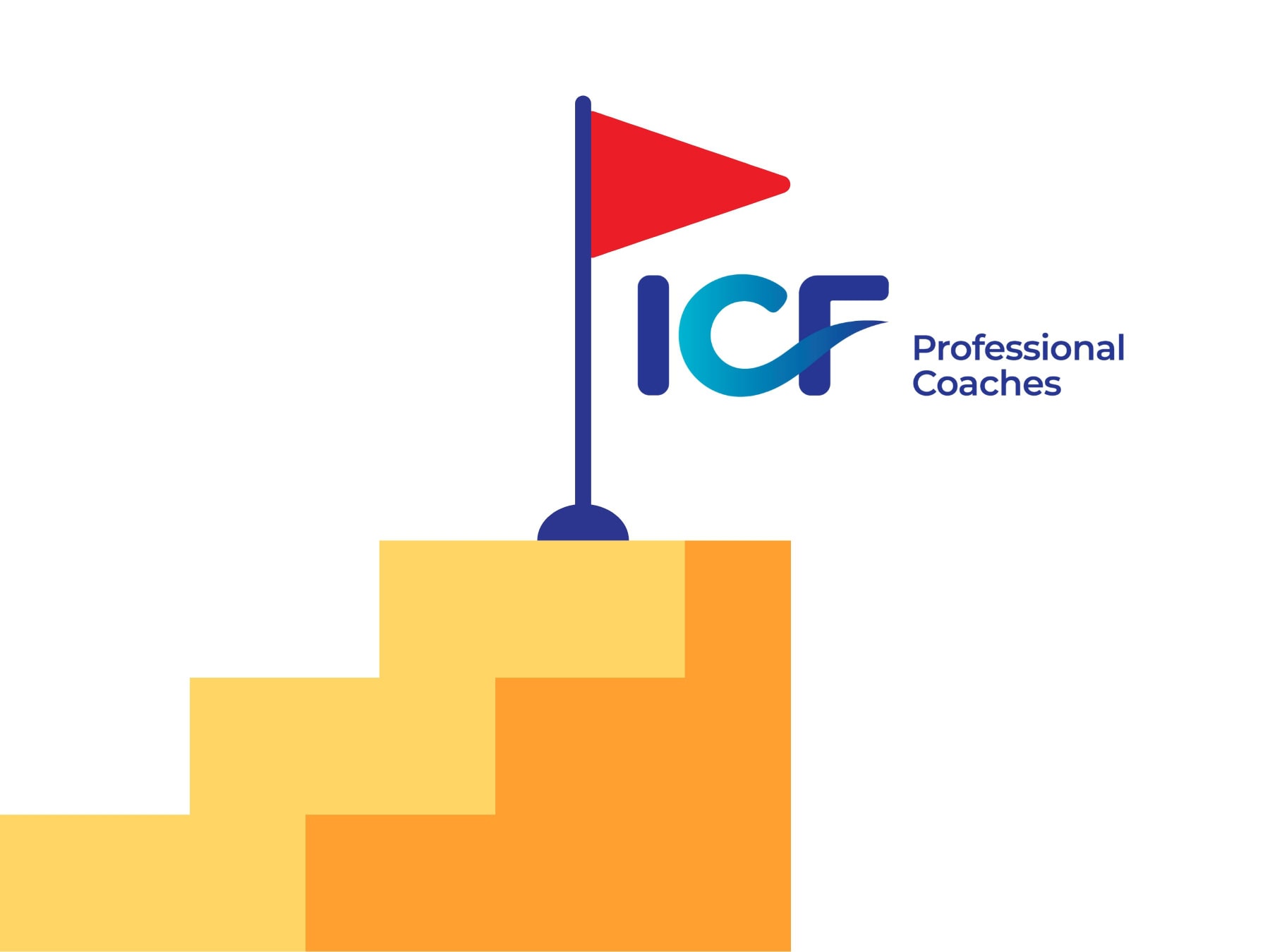In a world where adaptability and innovation are key, organizations are rethinking how they support and develop their people. Coaching is no longer just an individual perk – it’s a game-changing strategy for building stronger teams, developing leaders and growing a culture.
Bringing coaching into your organization isn’t just about keeping up with the times; it’s about creating a workplace where people thrive and the business grows. And if you’re not investing in coaching for your teams, your competition probably is. This guide will show you how to unlock the power of coaching, from choosing the right model to building a culture that delivers long-term results.
Empower Your Team with a Coaching Culture
Download our playbook to inspire growth, foster collaboration, and drive success by embedding a coaching mindset into your organization's DNA."
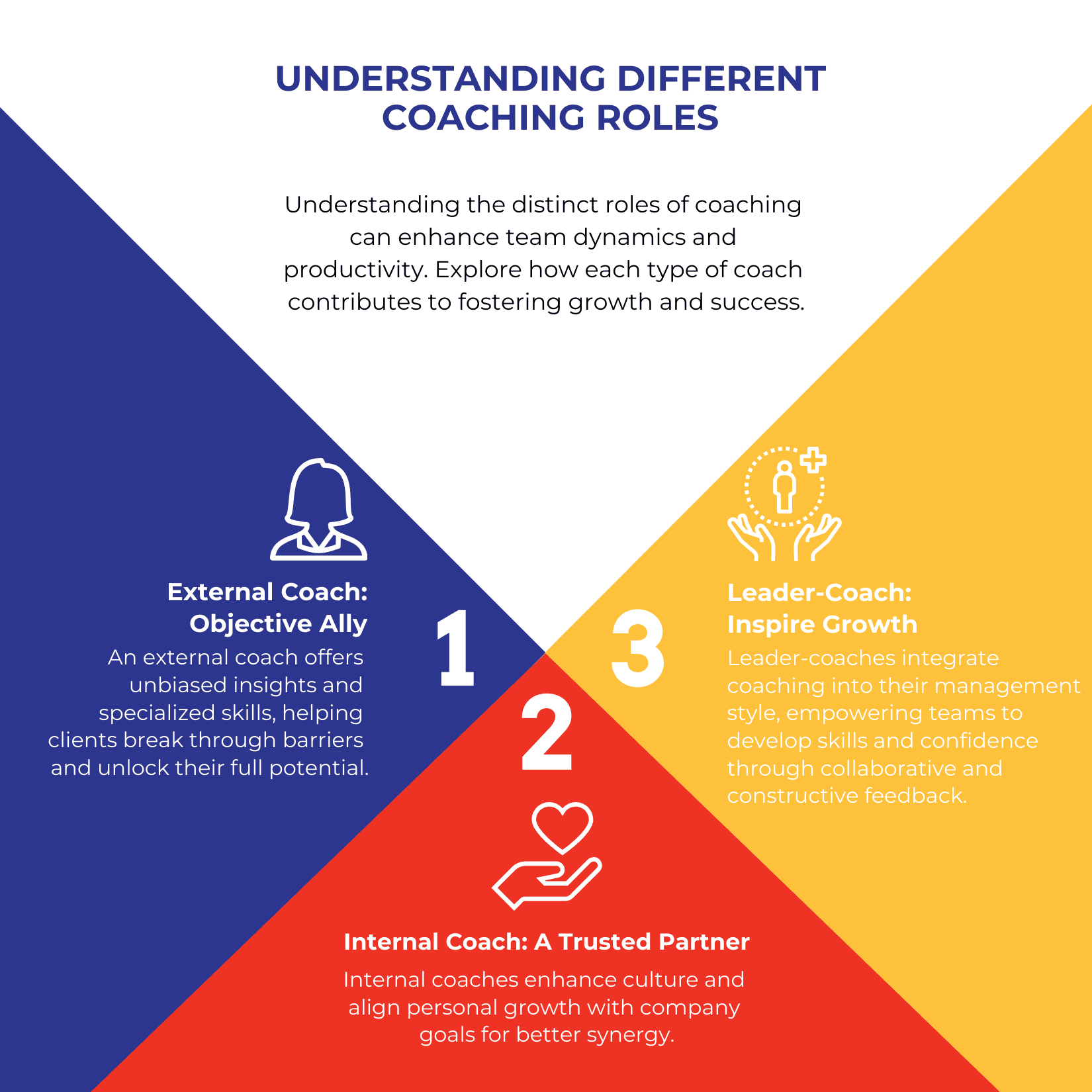
Coaching Modalities in Organizations
Coaching in organizations isn’t just about development – it’s about strategy. To support their workforce, companies have different coaching structures to match their goals and resources. These structures fall into three main modalities: external coaches, internal coaches and leaders who use coaching skills. Each modality has its benefits. Knowing these benefits will help you decide what’s best for your organization. Let’s get started:
External Coaches
External coaches are independent contractors or part of coaching firms brought in to support teams, build culture and tackle specific organizational challenges. They bring an outside in perspective and often specialize in high-level or niche areas.
You might be thinking, “why would I go to an external coach?” External coaches bring an unbiased perspective and specialize in navigating large-scale change. Their outsider status allows them to address sensitive dynamics and get alignment across diverse teams.
Internal Coaches
Internal coaches are employees within the organization whose role is explicitly defined to include coaching responsibilities. They have deep organizational knowledge and are part of the company culture so are a great resource for ongoing development.
The case for internal coaching is that they are rooted in the organization. They know the company culture, goals and processes intimately. This means they can offer tailored support that aligns with organizational objectives and provide continuous, accessible development opportunities.
Leaders Using Coaching Skills
In some organizations, managers, directors and other leaders are trained in basic coaching skills. They may not have formal coaching qualifications but use coaching techniques to support their teams, build collaboration and drive performance.
When leaders in the organization use coaching skills everyone wins! Leaders with coaching skills can weave coaching into everyday conversations. This builds trust, encourages open communication and empowers employees to take ownership of their work – all without needing external resources.

Benefits of Bringing Coaching to the Workplace
Bringing coaching into your workplace is more than a trend – it’s a proven way to create a thriving, engaged and resilient workforce. Whether you’re looking to develop leadership, improve communication or reduce burnout, coaching delivers tangible benefits that impact every part of your organization. Here are some of the most common outcomes of workplace coaching:
- Better communication across teams and departments.
- Stronger leadership pipelines and leadership development.
- Increased employee engagement and morale.
- Lower employee turnover.
- Reduced burnout.
- Higher job satisfaction and internal NPS.
This is not an exhaustive list but the impact of coaching will depend on the type and scale of the coaching approach you use. Whether through external professionals, internal coaches or leaders trained in coaching the right approach will deliver results.
What Is a Coaching Culture?
A coaching culture is more than a perk – it’s a strategic move that enables everyone at all levels to grow their skills, increase their value and achieve their career goals.
When you invest in a coaching culture you’re not just helping individuals thrive – you’re creating an environment that attracts, retains and develops top talent. In today’s competitive market, having a coaching culture can be the difference that sets your business apart and succeeds.
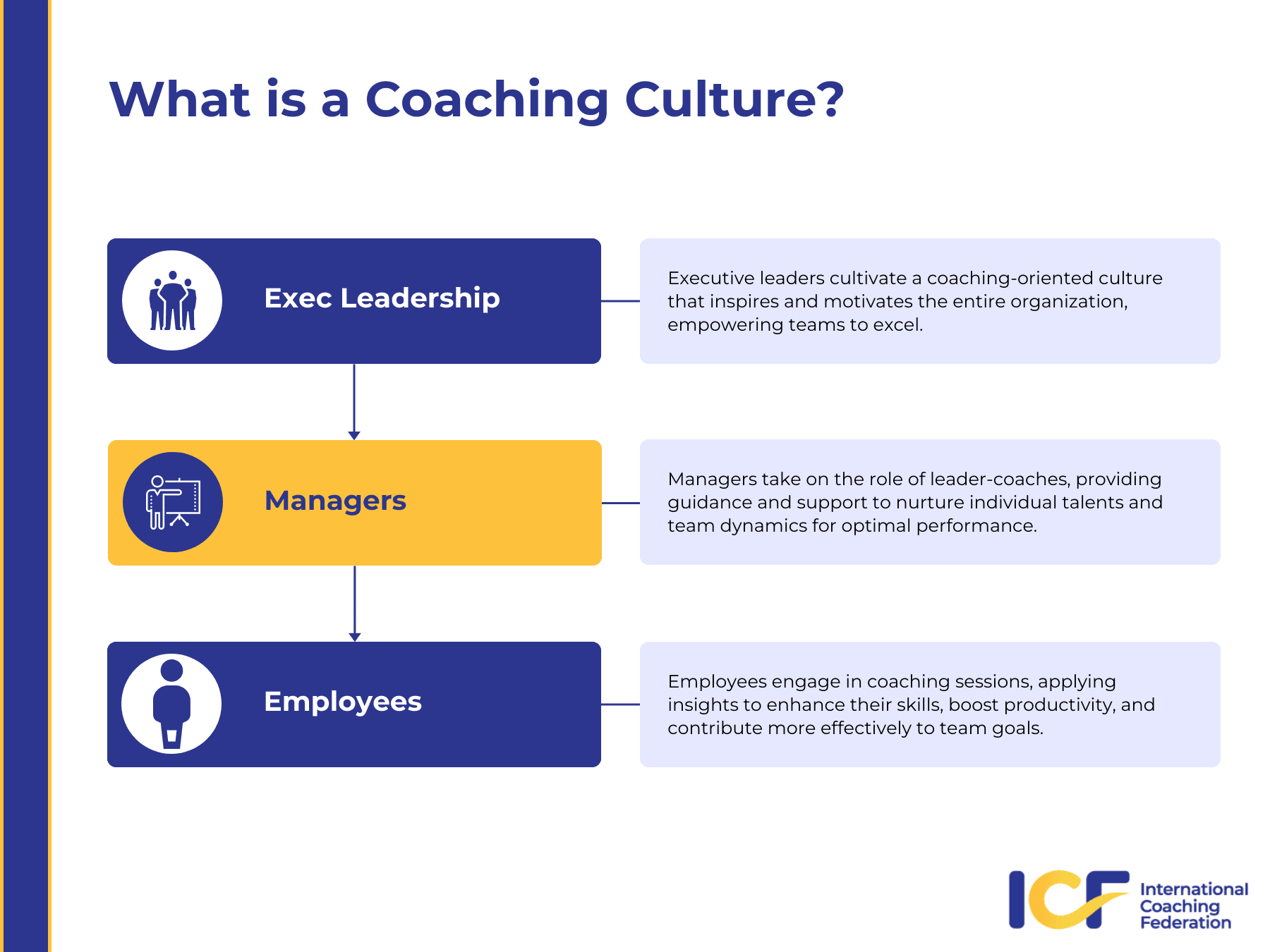
What Are the Benefits of a Coaching Culture?
A coaching culture has a ripple effect of positive outcomes that touches every part of your business. According to ICF’s most recent joint research study with the Human Capital Institute (HCI), organizations with a coaching culture report:
- Stronger leadership development.
- Higher employee engagement.
- Greater commitment and loyalty.
- Better employee relations and communication.
- Improved team functioning and collaboration.
- Growth in employee emotional intelligence.
- Higher job satisfaction and morale.
These benefits don’t stop at the individual level – they’re felt across the business. Unlike businesses where coaching is offered as an employee benefit, a coaching culture embeds coaching principles into the business DNA.
Additionally, coaching can have a profound impact on employee well-being and support personal and professional optimization. In an environment where businesses are investing billions of dollars into employee wellness programs, coaching can offer significant benefit!
A coaching culture is a shared growth mindset where the responsibility for development is owned by the individual and the business as a whole. It’s about continuous improvement, collaboration and innovation – the foundation for long-term success.
Why Coaching Culture Matters?
A coaching culture isn’t a tick box – it’s an investment in your people and your future. It takes commitment and resources to set up but the returns can be massive. Just like individuals who get outsized benefits from coaching, organizations that adopt a coaching culture see measurable, game-changing results.
Take OQ Group as an example of the benefits of a coaching culture. During a tough time for the organization and the industry, they implemented a coaching culture to steady and grow. What happened?
- 86% of senior leaders reported increased confidence in their leadership.
- 85% saw employee satisfaction increase.
- And by bringing in house certified coaches the organization saved over $270,000 USD.
AstraZeneca responded to employee requests for a growth strategy by introducing a coaching culture. The results were clear:
- 89% of employees said they had improved skills.
- 83% felt they had more opportunities for personal development.
These aren’t one off’s. Organizations that put coaching cultures first see benefits beyond morale and satisfaction. According to a joint ICF and HCI study organizations with strong coaching cultures outperform their peers on revenue.
It’s an investment in happy, engaged employees, better leadership and a bigger bottom line. Not just staying afloat.
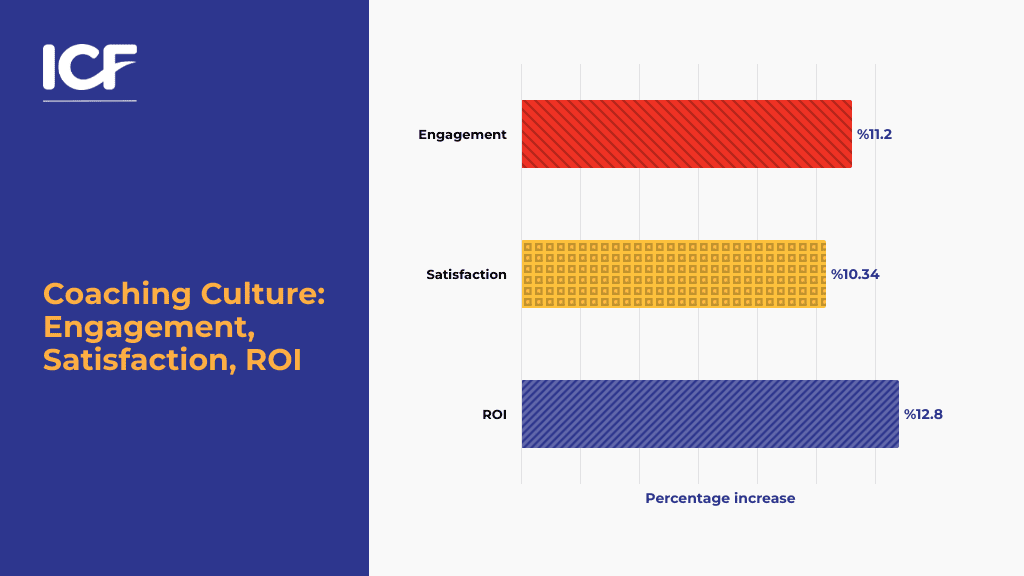
Related Case Studies
Coaching As a Catalyst for Change at Intel
When you think of Intel, you picture a global tech leader and…
Coaching Across Cultures at Tata Consultancy Services
Creating a coaching culture at scale means addressing the realities of a…
Fostering a Culture of Care, Growth, and Impact at TD Bank Group
TD Bank Group has redefined leadership development through a powerful coaching initiative…
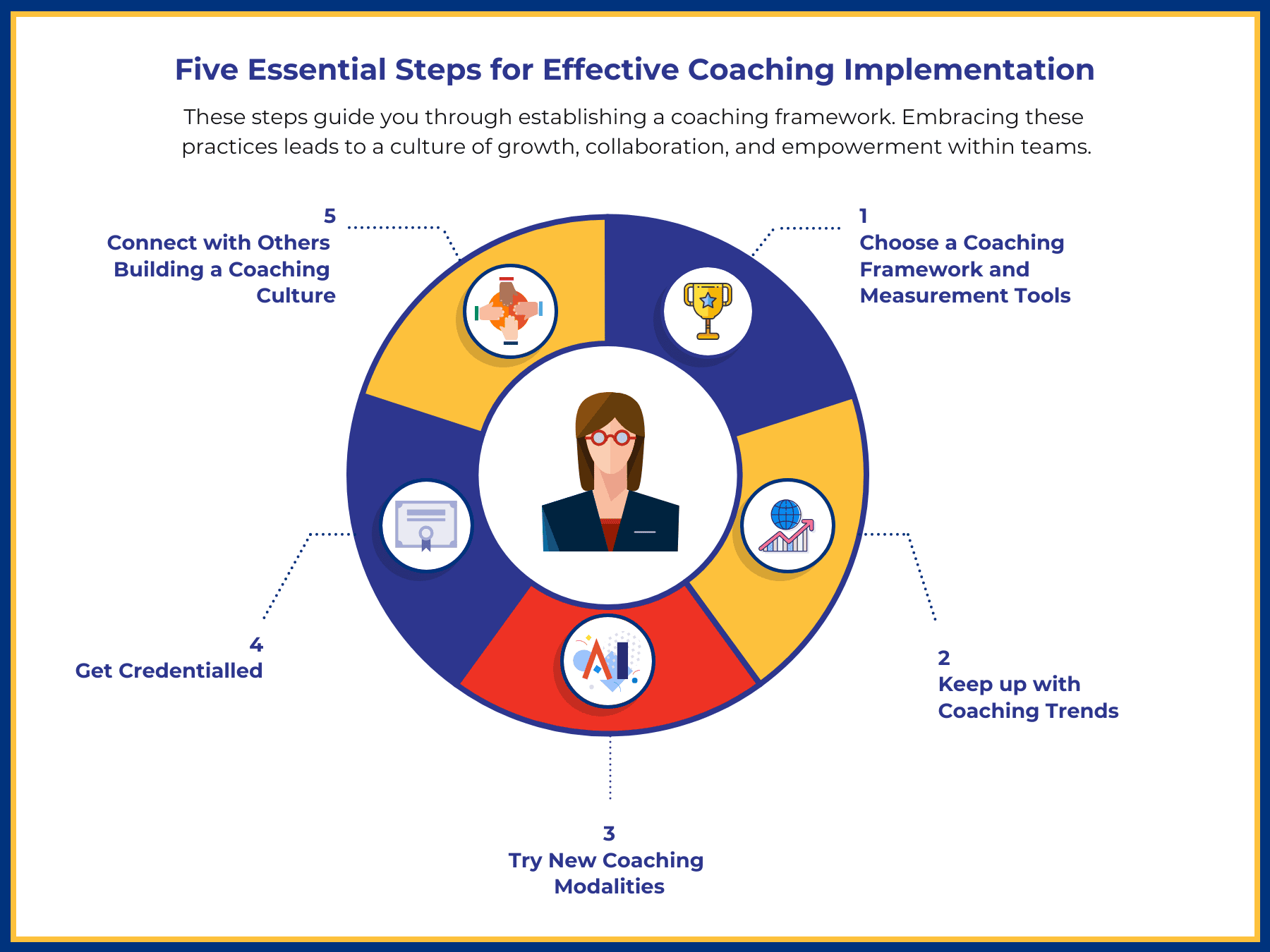
How to Build a Coaching Culture
Building a coaching culture isn’t a quick fix – it’s a long-term investment in your organization’s future. To build a sustainable and impactful coaching culture your organization can follow these five steps:

How to Find a Credentialed Coach for Your Organization
Finding the right coach for your organization doesn’t have to be a headache. The ICF Credentialed Coach Finder (CCF) makes it easier than ever to connect with coaches who meet the highest standards of professionalism and deliver results.
HR leaders use the tool to look for coaches who can support your organization’s specific goals—whether that’s leadership development, team dynamics or employee engagement.
Using The Credentialed Coach Finder
The CCF allows you to:
- Filter by Credential: Choose from Associate, Professional or Master Certified Coaches to find the level of expertise you need.
- Coaching Themes: Filter your search by specific organizational needs, leadership development, team building or employee engagement.
- Coaching Methods: Find coaches who offer in-person sessions, virtual coaching, group workshops or one-on-one support.
- Compare Rates: Stay within your budget and find the best fit for your organization.
Once you’ve found potential coaches, the CCF allows you to send a Request for Proposal (RFP) anonymously. The platform will forward your request to your chosen coaches and their responses will be sent back to you so you can review and compare options easily.
No cost to use and will save you time, find your coach or coaching team to drive real change in your organization. Whether you’re just starting to build a coaching culture or looking to grow what you already have the CCF is your one stop shop for credentialed coaches.
Start Your Coaching Journey
Coaching is an investment in your organization’s future. It’s about more than performance or job satisfaction – it’s about a workplace where growth and innovation are embedded at every level.
Whether you’re just starting to explore coaching or looking to scale a coaching culture, the tools and insights in this guide will help you get started. The possibilities are endless when coaching is part of your organization’s strategy.
Get started now? Visit the ICF Credentialed Coach Finder to connect with credentialed coaches today.
